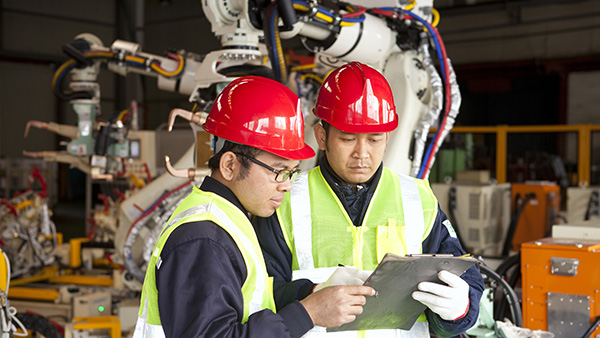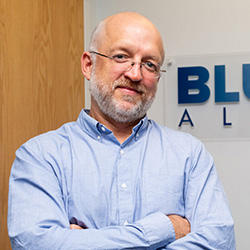Volume 27 | Issue 2
Click here to read the complete illustrated article or continue below to read the text article.
The advancements of the industrial revolution have undeniably shaped every aspect of human history but in the centuries since then, too little progress has been made for the industrial sector to keep up with the needs of society and the needs of our planet. We need a new industrial revolution, a clean industrial revolution. Recently, the U.S. Department of Energy announced the awardees for its Industrial Demonstrations Program (IDP)—an initiative championed by President Biden and Congressional Democrats in their landmark climate and infrastructure laws.
The awardees include projects on the cutting edge of industrial transformation, pursing ambitious technological and process advances that will drive down pollution; drive up the creation of good paying, union jobs; and make U.S. manufacturers more economically competitive across the nation.
For example, at their steel facility in Middletown, Ohio, Cleveland Cliffs will overhaul its integrated iron and steel mill with cutting- edge clean hydrogen-ready direct reduced iron technology that will cut greenhouse gas emissions at the plant by an estimated 1 million tons per year, providing a road map for the decarbonizing of our nation’s critical primary steelmaking sector. The International Association of Machinists and Aerospace Workers Local Lodge 1943 represents 2,000 workers at this facility and the project is expected to create 170 more permanent jobs and 1,200 temporary building trade union jobs.
In Kentucky, Century Aluminum is proposing to build a new facility that would not only be the cleanest and most efficient aluminum smelter in the world, but it would also be the nation’s first new primary aluminum facility since 1980. This would effectively double the size of the U.S. aluminum industry and help reduce our dependence on foreign production. The project is expected to create more than 1,000 onsite jobs—anticipated to be represented by the United Steelworkers—plus more than 5,000 construction jobs per year during the three-year construction period.
Another Cleveland Cliffs facility in Butler, Pennsylvania is advancing a project that will reduce emissions and energy consumption— making cleaner, higher quality electrical steel that will help decarbonize the automotive industry’s supply chain—by replacing two natural gas-fired reheat furnaces with electrical induction reheat furnaces. The Butler Works facility—where many workers are represented by United Auto Workers Local 3303—already employees 1300 people and the new project is anticipated to secure 1,470 family-sustaining jobs.
These are truly groundbreaking technologies and processes that will be transformative, launching a new era for our nation’s industrial sector.
This is huge. Building the cleanest products possible and a strong domestic supply chain to manufacture the nuts and bolts of a new, clean economy in the U.S. is vital to the future of workers and our planet. The industrial sector represents a significant slice of U.S. emissions and is the only sector whose emissions are projected to rise in the coming decades. The projects awarded funding by the IDP are projected to reduce carbon dioxide emissions by the equivalent of more than 14 million metric tons of carbon dioxide (CO2) emissions each year—roughly the annual emissions of 3 million gasoline-powered cars. Along with greenhouse gases, industrial facilities pump out other forms of air and water pollution, which can negatively impact the communities around them, often predominantly communities of color.

Until recently, investment in reducing industrial emissions in the U.S. was relatively limited. However, President Biden’s landmark infrastructure and climate laws established and expanded investment programs—like the IDP—to reduce emissions in energy-intensive industries, such as steel, aluminum, and cement.
The benefits of investing in industrial transformation are undeniable. Driving down emissions and pollution will advance our climate goals and improve public health. And, these investments will create and sustain good union jobs, helping roll back economic inequality and reverse the slide in wages, benefits, and workers’ rights that has undermined workers and their communities for decades. The IDP award recipients were required to meet a robust set of criteria to ensure local communities and workers benefit from the proposed projects. Each project was required to submit a community benefits plan and nearly 80 percent of the projects are in a disadvantaged community.
Additionally, transforming energy-intensive domestic industries that produce essential materials with some of the lowest emissions in the world will ensure we’re not importing goods and materials—and pollution—from overseas as we continue to build out the clean, thriving, and equitable future our workers and communities deserve.
The IDP is proof that President Biden is invested in rebuilding U.S. manufacturing to be the backbone of our economy, helping workers get to the middle class with good union jobs and bringing equity and opportunities to communities that have been on the hurting end of the loss of manufacturing jobs. With the investments announced this week, we see that the U.S. can compete and lead in the industrial revolution of the 21st century.

Jason Walsh is the Executive Director of the BlueGreen Alliance, which unites labor unions and environmental organizations to solve today’s environmental challenges in ways that create and maintain quality jobs and build a clean, thriving, and equitable economy.
Tune in for a timely conversation with Susan Spence, MBA, the new Chair of the ISM Manufacturing Business Survey Committee. With decades of global sourcing leadership—from United Technologies to managing $25B in procurement at FedEx—Susan shares insights on the key trends shaping global supply chains and what they mean for the manufacturing outlook.